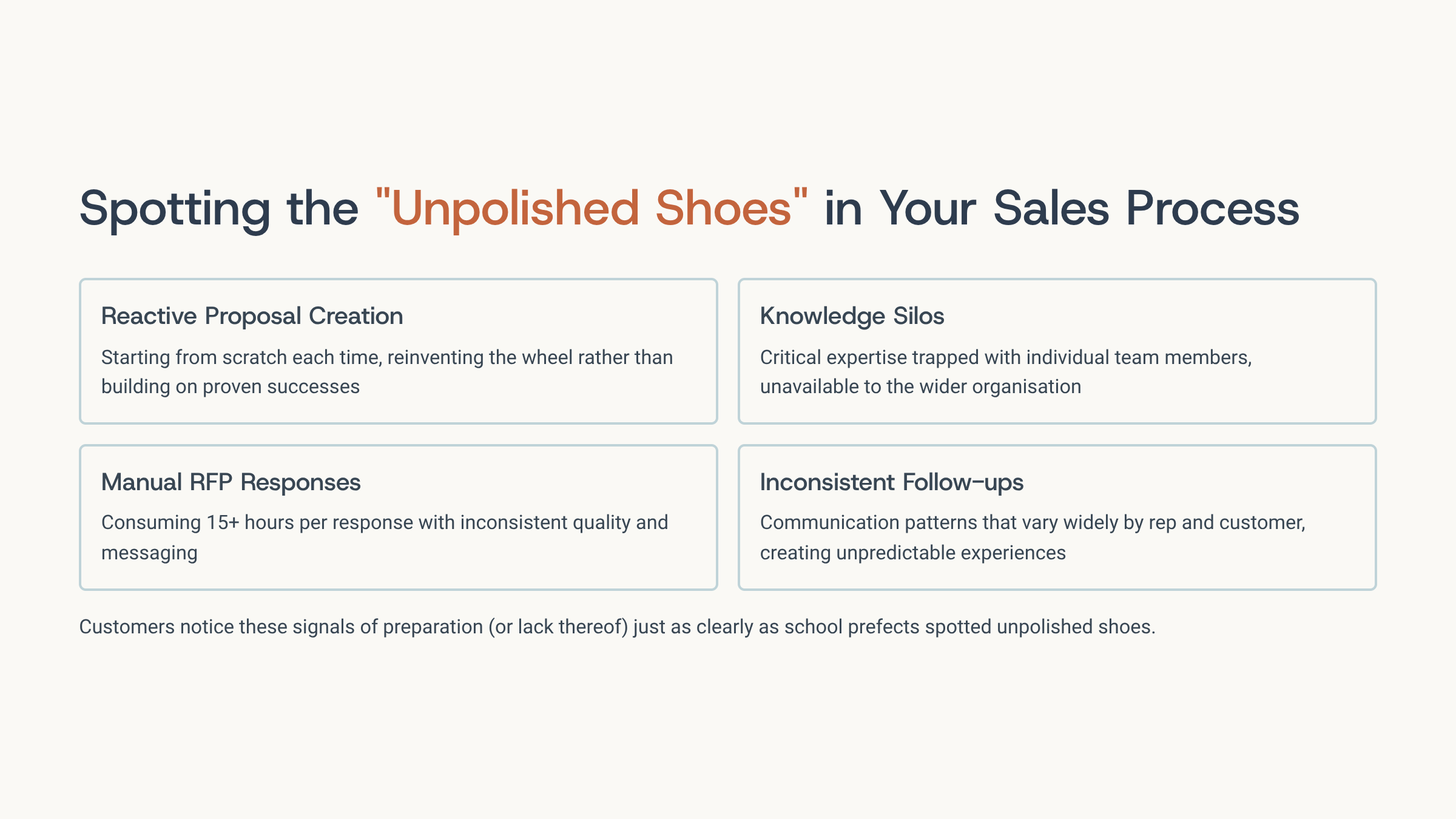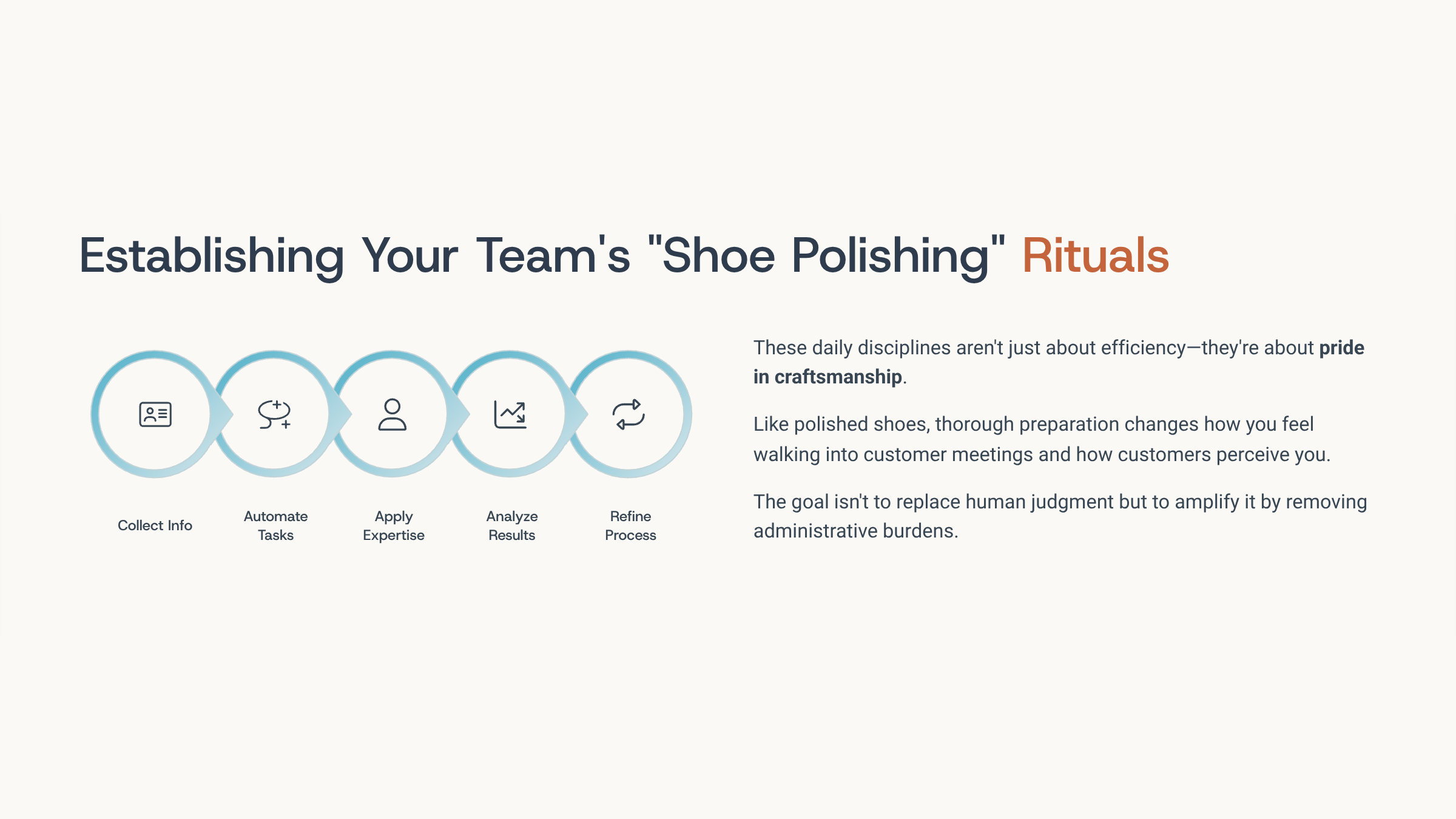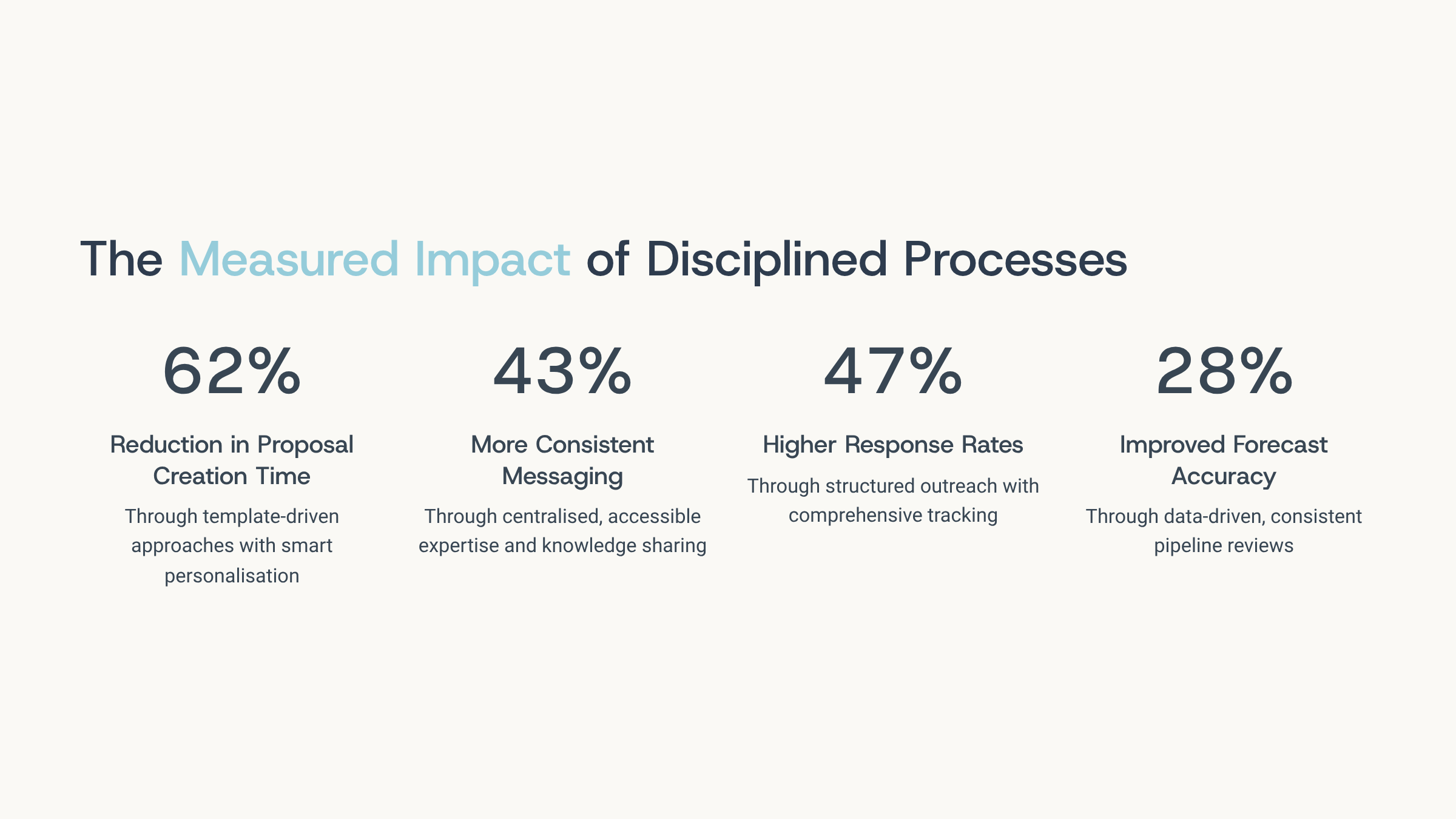The Small Habits That Separate Good Sales Teams from Great Ones
Article written by
Runcie Varghese

INSIDE THE ARTICLE
SHARE THIS ARTICLE
Summary
- Daily discipline rituals can reclaim the 65% of time sales teams lose to administrative tasks
- Small, consistent habits create measurable performance gains (43% larger deals, 33% shorter sales cycles)
- Technology should enhance human relationships, not replace the expertise that drives complex sales
- Your current sales process likely has "unpolished shoes" that signal deeper preparation issues
- The right combination of human expertise and smart automation creates sustainable competitive advantage
Why Do Top Sales Performers Spend So Much Time on Non-Selling Activities?
Growing up in an army household with both parents in the forces, discipline wasn't something we discussed—it was just how we lived. One ritual stands out in my memory: polishing shoes every single night. No matter how tired I was, that brush and polish had to be put to work.
Back then, it felt like just another chore. Today, looking back through the lens of nearly two decades in sales leadership, I realize this simple habit shaped everything about how I build high-performing teams.
Like most sales leaders, I've grappled with a fundamental challenge: why do talented sales professionals spend up to 65% of their time on non-selling tasks? This inefficiency isn't just frustrating—it's expensive, costing organizations millions in lost productivity and unrealized revenue.
What Can a Childhood Embarrassment Teach Us About Sales Excellence?
School life added another layer of accountability to my shoe-polishing ritual. During morning assembly, prefects would inspect every detail—shoes, nails, uniform. If your shoes weren't polished to perfection, you'd be called out in front of everyone.
I still cringe remembering the morning I'd skipped polishing my shoes. The dull shine didn't go unnoticed, and facing that public embarrassment was mortifying.
Around this time, I found a book called The Umbrella Man with a line that struck me deeply: "A man is known by the shoes he wears." Suddenly, my nightly ritual gained new meaning. Polishing wasn't just about avoiding punishment—it was about personal pride.
The same principle applies to sales teams. When organizations lack structured processes for managing customer communications, proposal creation, and knowledge sharing, it shows. Customers notice these "unpolished shoes"—the delayed responses, inconsistent messaging, and generic proposals that signal a lack of preparation.

How Do Consistent Habits Transform Enterprise Sales Results?
Years later, as I built sales organizations at companies like Oracle, Tableau, Zendesk, and HubSpot, I've repeatedly returned to these childhood lessons.
In my first leadership role at Oracle? I inherited a team that was struggling—missing targets, inconsistent customer interactions, scattered processes. The talent was there, but something was missing.
My instinct was to look for the daily habits that were (or weren't) happening. What were the "unpolished shoes" in our sales approach? The things that seemed small but signaled a lack of preparation?
I spotted them immediately:
- Reactive proposal creation (starting from scratch each time)
- Knowledge silos (expertise trapped with individual team members)
- Manual RFP responses (consuming 15+ hours per response)
- Inconsistent follow-up processes (varying by rep and customer)
These weren't strategy problems—they were discipline problems.
In my most successful team at Zendesk (the one that eventually became Best Sales Team in APAC 2022), we established our own version of "shoe polishing rituals":
Daily Discipline | Traditional Approach | Our Disciplined Approach | Measured Impact |
Knowledge Sharing | Information siloed with experts | Centralized, accessible expertise | 43% more consistent messaging |
Proposal Creation | Starting from scratch each time | Template-driven with personalization | 62% reduction in creation time |
Customer Communications | Ad-hoc, inconsistent follow-ups | Structured outreach with tracking | 47% higher response rates |
Pipeline Management | Gut-feel forecasting | Data-driven, consistent reviews | 28% improved forecast accuracy |
Some team members initially rolled their eyes. "Is this really necessary?" they'd ask. "We're adults, not kids in school!"
But six months later? The same skeptics were our biggest ritual advocates. One rep even confessed, "I used to think this was overkill, but now I can't imagine working any other way."
How Do You Balance Automation with Human Expertise?
Here's what I learned leading global sales teams: the most effective organizations aren't replacing human judgment with technology—they're amplifying it.
At HubSpot, we think about sales enablement as human-centered augmentation. Technology should handle the repetitive tasks so sales professionals can focus on what they do best: building relationships, understanding business challenges, and crafting compelling solutions.
The impact was undeniable when we implemented this approach at Zendesk. When I took over the ASEAN region, we transformed from middle-of-the-pack performers to:
- Closing the largest deal in APAC history
- Ranking 4th globally for the fiscal year
- Increasing average deal sizes by 43%
- Reducing sales cycles from 6+ months to under 4 months
But the numbers miss the most important part: how it felt. There's a certain confidence that comes from knowing you've done the preparation. My team walked into customer meetings with that same feeling I had as a kid walking into school with freshly polished shoes—ready for inspection, knowing we'd done our part.

What Lessons Can Transform Your Sales Organization Today?
If I had to distill what shoe polishing taught me about building elite sales teams, it would be these five things:
1) The small things aren't small at all Missing a CRM update might seem minor, but like an unpolished shoe, it signals something deeper about attention to detail and commitment to process.
2) Public accountability changes behavior At school, knowing my shoes would be inspected created urgency. In sales, our public stand-ups and reviews create the same effect. Nobody wants to be the one who didn't prepare.
3) Consistency compounds dramatically The difference between polishing shoes for 10 minutes every day versus a rushed job once a week is massive. The same applies to how we approach customer communications, proposal creation, and knowledge management.
4) Pride is contagious When I became proud of my perfectly polished shoes, it changed how I felt walking into school. When our team became proud of our preparation, it changed how customers perceived us.
5) Technology should enhance, not replace, human judgment The most successful sales organizations use technology to handle repetitive tasks while allowing human expertise to focus on relationship building and strategic thinking.
How Can You Apply These Lessons to Your Sales Process?
Look, I'm not suggesting you start polishing shoes every night (though it wouldn't hurt!). But I am suggesting you identify the equivalent in your sales organization—those small, daily disciplines that signal preparation, attention to detail, and pride in your work.
For your team, it might be:
- Collect: Centralize all your customer information, requirements, and communication in one accessible place
- Automate: Identify repetitive tasks that consume selling time and implement technology to streamline them
- Act: Apply human expertise to review, tailor, and perfect customer-facing deliverables
- Analyze: Establish consistent review processes to identify gaps and improvement opportunities
- Repeat: Create a feedback loop that continuously refines your approach based on results
Whatever approach you choose, the principle remains: excellence isn't built through grand strategies but through humble, consistent habits performed with pride.

Is Your Sales Team Ready for Transformation?
Next time you're tempted to skip a seemingly minor sales discipline, remember my unpolished shoes and that moment of standing out for all the wrong reasons. Sometimes the difference between good and great isn't what you know or who you know—it's simply what you do consistently when nobody's watching.
The stats speak for themselves. Teams that implement structured sales processes with smart automation typically achieve:
- 50-60% faster creation of customer-facing materials
- 60-70% reduction in administrative burdens
- 10-30% higher win rates through consistent follow-up
- 2-3X increase in deal capacity without adding headcount
But don't take my word for it. Take a hard look at your own sales process. Where are your "unpolished shoes"? What small, daily disciplines could transform your results if performed consistently?
And yes, for what it's worth, I still polish my shoes before every major customer meeting. Old habits die hard.
Ready to see how AI can transform your RFP process?
Sales Head - South East Asia @ HubSpot | Ex- Zendesk, Salesforce, Oracle | GTM strategist | Keynote speaker | Mentor | Driving growth & innovation across APAC.

